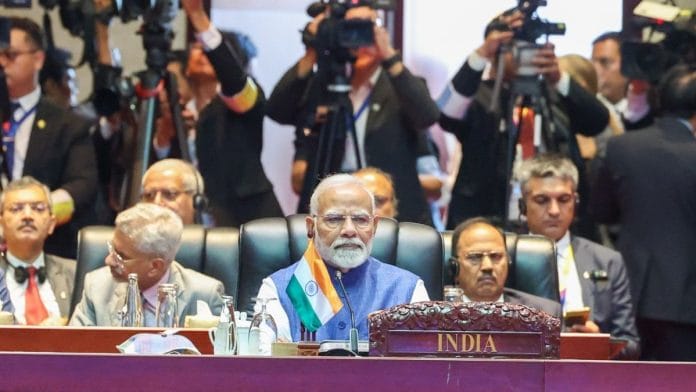New Delhi: Taking aim at China without naming it, Prime Minister Narendra Modi called for respecting “sovereignty and territorial integrity” at the East Asia Summit Friday, asserting that activities in the South China Sea should be based on international law with the focus being on “development”, not “expansionism”.
“India has consistently supported the unity and centrality of ASEAN (Association of Southeast Asian Nations). ASEAN is also pivotal to India’s Indo-Pacific vision and Quad cooperation…A free, open, inclusive, prosperous, and rules-based Indo-Pacific is crucial for the peace and progress of the entire region. The peace, security, and stability in the South China Sea are in the interest of the entire Indo-Pacific region,” said Modi during his intervention at the East Asia Summit in Laos.
“We believe that maritime activities should be conducted in accordance with UNCLOS (United Nations Convention on the Law of the Sea). Ensuring freedom of navigation and airspace is essential. A robust and effective Code of Conduct should be developed. And, it should not impose restrictions on the foreign policies of regional countries. Our approach should focus on development and not expansionism,” the prime minister added.
Modi was in Laos Thursday and Friday for the 21st ASEAN-India Summit and the 19th East Asia Summit respectively.
Modi’s intervention at the East Asia Summit does not mention Beijing, but is a clear indication of India’s support towards the member states of ASEAN, a regional grouping of 10 Southeast Asian nations that works to promote political, economic and social cooperation and stability in the region.
A few ASEAN member states have been involved in incidents with China in the South China Sea in the past few months.
In the first week of October, Vietnam protested against Chinese authorities for allegedly beating up Vietnamese fishermen and removing fishing equipment from the vessel—which was operating in a region that both countries claim to be theirs.
The Philippines is another country which has faced a number of incidents in the South China Sea, including claims of Chinese vessels ramming into its coastguard vessels or preventing the restocking of the Philippine Navy vessel BRP Sierra Madre, which has been aground on the reef of Second Thomas Shoal since 1999.
Also Read: Ports, grants, defence to detained fishermen, key takeaways from Jaishankar’s visit to Sri Lanka
India’s deepening ties with Manila in full bloom
In 2016, a United Nations arbitration award dismissed China’s claims under the nine-dash line (U-shaped line used by the Communist Party of China (CPC) to illustrate claims to the South China Sea), while accepting a number of Manila’s (capital of the Philippines) submissions.
India has backed the Philippines’ position in its tiff with China and has urged strict adherence to the UN Convention on the Law of the Sea (UNCLOS) 1982, also known as the “constitution of the seas.”
Modi’s call for developing an “effective code of conduct” in matters regarding the South China Sea reaffirms further support for ASEAN’s position on the issue in the region.
ASEAN and China opened negotiations for a code of conduct (COC) in March 2018 to promote a peaceful and stable environment in the South China Sea. Beijing and the regional grouping first agreed to the idea of a maritime code in 2002.
However, negotiations have remained extremely slow. Philippine President Ferdinand Marcos Jr. Thursday called for urgency from Beijing and ASEAN member states to fast-track negotiations around the COC.
Manila continues to be subjected to “harassment and intimidation” in the South China Sea, Marcos said during his intervention in the ASEAN-China Summit.
New Delhi’s support for the COC mirroring Manila’s position highlights the deepening of ties between the two countries. The Philippines is the first country to purchase $375 million worth of BrahMos supersonic missiles from India, deliveries of which began earlier this year.
Myanmar situation & bilateral meets with other nations
Modi also called for more engagement with Myanmar to ensure the implementation of suitable measures to return India’s northeastern neighbour to democracy. Myanmar, which has been in the midst of a civil war since 2021, saw its first high-level representation at an ASEAN summit in three years.
“We endorse ASEAN’s approach to the situation in Myanmar and support the Five-Point Consensus. Furthermore, we believe it is crucial to sustain humanitarian assistance and implement suitable measures for the restoration of democracy. We believe that Myanmar should be engaged rather than isolated in this process,” said Modi.
Apart from representing India at the two summits, Modi also held bilateral talks with different world leaders including the prime ministers of Japan, New Zealand, Thailand and Laos.
The meeting between Modi and his Laotian counterpart, Sonexay Siphandone, saw the two leaders witness the signing of seven Memorandums of Understanding (MoUs) and agreements in the fields of defence, broadcasting, and customs cooperation, and three Quick Impact Projects (QIP).
Jaideep Mazumdar, secretary (east) in the Ministry of External Affairs, during a special briefing after the bilateral meetings Friday, explained that with regards to defence cooperation with Laos, India has agreed to aid in training and capacity building of the Laotian armed forces.
Furthermore, the Indian government will be assisting Laos with the preservation and performance of Phalak-Phalam (Laotian Ramayana), renovation of the Vat Phakea temple in Luang Prabhang and the preservation of shadow puppet performances in Champasak province with three QIPs of $50,000 each.
India has also agreed to a $1-million grant to improve nutritional security in Laos.
The meetings with the prime ministers of Thailand (Paetongtarn Shinawatra), Japan (Shigeru Ishiba) and New Zealand (Christopher Luxon) were Modi’s first with the respective leaders.
Apart from the bilateral meetings, Modi had brief interactions with Philippine President Marcos, European Council President Charles Michel and Australian Prime Minister Anthony Albanese.
(Edited by Radifah Kabir)
Also Read: India & Maldives reboot ties, sign currency swap agreements as Muizzu & Modi meet






